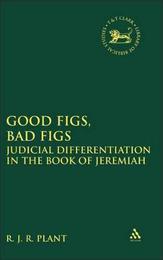
|
Good Figs, Bad Figs: Judicial Differentiation in the Book of Jeremiah
Hardback
Main Details
| Title |
Good Figs, Bad Figs: Judicial Differentiation in the Book of Jeremiah
|
| Authors and Contributors |
By (author) R.J.R. Plant
|
| Series | The Library of Hebrew Bible/Old Testament Studies |
|---|
| Physical Properties |
|
| Category/Genre | Biblical studies |
|---|
| ISBN/Barcode |
9780567026873
|
| Classifications | Dewey:224.206 |
|---|
| Audience | | Undergraduate | | Postgraduate, Research & Scholarly | | Professional & Vocational | |
|---|
|
Publishing Details |
| Publisher |
Bloomsbury Publishing PLC
|
| Imprint |
T.& T.Clark Ltd
|
| Publication Date |
15 May 2008 |
| Publication Country |
United Kingdom
|
Description
Good Figs, Bad Figs begins by reviewing how the Old Testament depicts YHWH exercising judgment in Israel. Three broad categories of judicial action are identified: selective, unselective, and national. It is noted that more than one of these may be juxtaposed within the same text, and that each is a corollary of a wider theological frame of reference. The rest of the study focuses on the concept of judicial differentiation in the book of Jeremiah. Jeremiah 1 - 20 announce wrath upon all Judah, while chs. 30 - 33 prophesy restoration for the entire Diaspora. Elsewhere, however, YHWH's judicial action is more nuanced. Jer. 21 - 24 differentiates between those who stay in Jerusalem and those who surrender (21.1-10), between Israel's leaders and people (23.1-8), and between the exiles and non-exiles (24.1-10). Jeremiah 27 - 29 also distinguishes between exiled and non-exiled communities, but adds a 'people and prophets' polarity. Finally, Jer. 37 - 45 offers hope to those who surrender (38.1-3) or remain in the land (42.1-22), alongside salvation oracles for two individuals who do not conform to these conditions (39.15-18; 45.1-5). Three main conclusions are drawn. Firstly, the polarities of judgment and salvation in Jer. are more varied than has generally been appreciated. Secondly, this diversity of perspective is theologically significant; it is suggested that each polarity offers a valid though incomplete lens through which to interpret God's judicial action. Thirdly, the concepts of judicial differentiation and non-differentiation may offer a helpful framework in which to read the book of Jeremiah as a whole.
Author Biography
Robin J.R. Plant, PhD (University of Edinburgh).Since 2003, he has been living in Timisoara, Romania, teaching Christian theology in local churches and Bible schools.He is currently a visiting professor at the Evangelical Theological Seminary, Osijek, Croatia.
Reviews"Its findings...are relevant for us all." -Dianne Bergant, C.S.A., The Bible Today, November 2008 "The literary structure of the books highlights the salvation oracles to Jeremiah and Baruch." International Review of Biblical Studies, vol. 54:2007/08 "Abraham's cry to YHWH - 'Will you sweep away the righteous with the wicked?' - serves as an entree into R.J.R. Plant's investigation of "judicial differentiation" in Jeremiah. With its harrowing account of Jerusalem's destruction, the prophetic work offers an excellent model by which to explore such a subject... Plant's careful attention to uncovering intertextual relationships within Jeremiah is very useful, and his contention that judicial selectivity forms one of the frames upon the final edition(s) was formed, is convincing and is a contribution to Jeremiah-scholarship. The author does stress that literary concerns dominate the present study, and the volume - which is to be recommended for its sensitive readings - should not be mistaken for a full-blown commentary." --Scott Morschauer, Rowan University, Hebrew Studies 50 (2009) -- Scott Morschauser, Rowan University 'The book uncovers the complexity and nuances of divine judgment and will be a worthwhile addition to the library of Hebrew Bible scholars.' -- Religious Studies Review 'A very well-done analysis with implications for theology and the practice of ministry. . . . Those who consider the book of Jeremiah to speak exclusively of judgment, as well as those who wish to reduce the plurality of the biblical witness to a single view, would do well to consider Plant's work.' -- Journal of Religion This work is a significant development both in scholarship on Jeremiah and on divine justice. It comes highly recommended to those with a basic knowledge of Hebrew, a desire to understand better the complexities of divine retribution, and the persistence to work through Plant's intricate argument. -- Expository Times "the greater part of Plant's work offers a detailed analysis of a kind which I had supposed to be almost extinct in doctoral dissertations... anyone working in this important theological area should certainly give close attention to Plant's work." -- R. J. Coggins * Journal for the Study of the Old Testament *
|